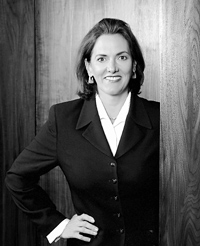| |
 |
| |
Blythe
McGarvie '78 |
| |
|
Alumni
Profile: Blythe McGarvie '78
Part
of the club, or alone above the fray?
Leadership
demands seemingly contradictory skills, says Kellogg author
By
Michelle Bryant
Do
you want to know the secret to being an effective leader in
business and life? Blythe McGarvie says the answer is simple:
"Pay attention."
This
is just one of the tidbits that McGarvie, a 1978 Kellogg School
graduate and finance expert, reveals in her new book, Fit
In, Stand Out: Mastering the FISO Factor for Success in Business
and Life (McGraw-Hill). By sharing her observations from
working with some of the most successful people in business,
McGarvie offers a distinctive approach to leadership, which
she believes can help companies and individuals achieve their
objectives and dreams.
"It's
amazing how much you can learn just by paying attention and
discerning, paradoxically, how to fit in and stand out,"
says McGarvie. "One of the things that I wanted to do
was to tell stories but also understand the results in a conceptual
framework."
McGarvie,
founder and president of Leadership for International Finance,
has a wealth of knowledge from which to draw. Over the span
of her 25-year career, she has served as executive vice president
and chief financial officer of BIC Group, one of the world's
leading manufacturers of convenient disposable products; senior
vice-president and chief financial officer of Hannaford Bros.
Co., a Fortune 500 supermarket retailer; and chief administrative
officer of Sara Lee Corp. (Pacific Rim).
But
in 2002, McGarvie, along with most of America, watched in
shock as the Enron scandal unfolded. For her, it hit too close
to home. Arthur Andersen LLP, one of the accounting firms
charged with obstruction of justice, was also her first employer.
"I
know Arthur Andersen spent a high percentage of revenues on
training and had a lot of terrific, bright people at the company.
It made me wonder how the company could have lost some of
the things I know they once had," says McGarvie. "I
wanted to share my thoughts and research about what a leader
must do to keep his North Star and have sustainable success."
It
was then she decided that being a company CFO wasn't enough.
McGarvie made it her personal mission to "restore trust
in business" by showing people it was possible to make
money in business legally and maintain personal integrity,
while still having fun.
After extensive
research, the Kellogg alum developed the FISO Factor. Emphasizing
the concepts of integration (fitting in) and transformation
(standing out), the FISO Factor is composed of six catalytic
agents: financial acuity, integrity, linkages, learning, perspective
and global citizenship. For each section, McGarvie offers the
ABC's — Attitude, Behavior and Characteristics
— giving practical measures on how to apply these concepts
and develop one's personal style. Although the FISO Factor accents
the importance of integration and transformation, McGarvie insists
that managing these elements is not simply a balancing act;
rather, it's about making a choice.
"I
think that this is excellent advice and a very insightful
way of thinking about leadership," says Kellogg School
Professor Mohan Sawhney. "Interestingly, the book itself
follows the FISO factor — it 'fits in' with the well-known
principles of leadership, yet it 'stands out' by offering
very personal and fresh insights from Blythe's own career."
One
of the business leaders featured in the book is fellow Kellogg
School alum Harry Kraemer. McGarvie notes that even when he
was CEO of Baxter International, Kraemer made a point every
day to walk past his very first cubicle at the company to
remind him of where he started.
"Understanding the history of a company or your own beginnings
really helps you keep your perspective," says McGarvie.
"I think that is one of the things this book has done
for me."
|





